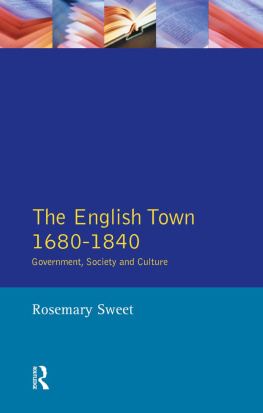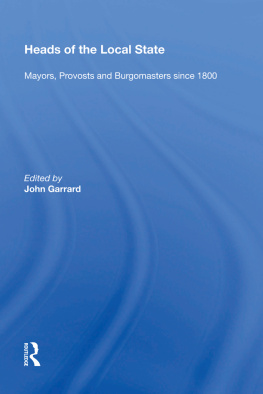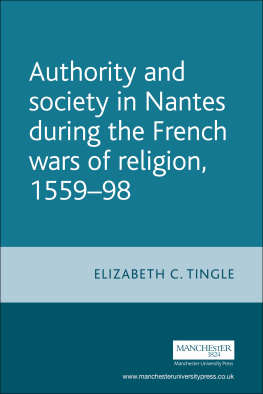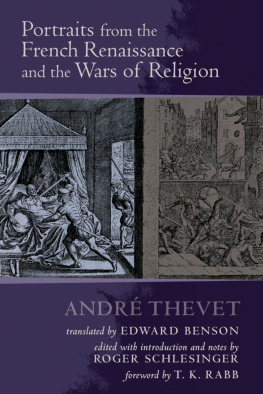Local Politics in the French Wars of Religion
First published 2006 by Ashgate Publishing
Published 2016 by Routledge
2 Park Square, Milton Park, Abingdon, Oxon OX14 4RN
711 Third Avenue, New York, NY 10017, USA
Routledge is an imprint of the Taylor & Francis Group, an informa business
Copyright 2006 Mark W. Konnert
Mark W. Konnert has asserted his moral right under the Copyright, Designs and Patents Act, 1988, to be identified as the author of this work.
All rights reserved. No part of this book may be reprinted or reproduced or utilised in any form or by any electronic, mechanical, or other means, now known or hereafter invented, including photocopying and recording, or in any information storage or retrieval system, without permission in writing from the publishers.
Notice:
Product or corporate names may be trademarks or registered trademarks, and are used only for identification and explanation without intent to infringe.
British Library Cataloguing in Publication Data
Konnert, Mark W., 1957
Local politics in the French wars of religion : the towns
of Champagne, the Duc de Guise, and the Catholic League,
156095. (St Andrews studies in Reform history)
1. Saint Ligue (157693) 2. Municipal government France
Champagne History 16th century 3. Cities and towns
France Champagne Social conditions 16th century
4. Champagne (France) History 16th century 5. France
History Wars of the Huguenots, 156298
I. Title
944.31029
Library of Congress Cataloging-in-Publication Data
Konnert, Mark W., 1957
Local politics in the French wars of religion : the towns of Champagne,
the Duc de Guise, and the Catholic League, 156095 / Mark W. Konnert.
p. cm. (St Andrews studies in Reformation history)
Includes bibliographical references.
ISBN 0754655938 (alk. paper)
1. France History Wars of the Huguenots, 156298. 2. Champagne
Ardenne (France) History 16th century. 3. Champagne-Ardenne
(France) Politics and government 16th century. 4. Mayenne, Charles de
Lorraine, Duc de, 15541611. 5. Saint Ligue (157693). 6. Cities and
Towns France Champagne-Ardenne History 16th century.
I. Title. II. Series.
DK611.C494K66 2006
320.944309173209031dc22
2005020533
ISBN 9780754655930 (hbk)
Typeset in Sabon by IML Typographers, Birkenhead, Merseyside
Contents
No project of this range and scope could be realized without significant support from a number of institutions and people. The initial research which allowed me to pursue this topic was made possible by a University of Calgary Research Grant. Research trips to France and other invaluable support was provided by a research grant from the Social Sciences and Humanities Research Council of Canada. Much of the actual writing was accomplished while I was relieved from teaching and administrative duties thanks to a residential fellowship from the Izaak Walton Killam Foundation. I simply could not have conducted this research without their generous support.
Closer to home. I owe the greatest debt of gratitude to my family. My mother and father, Bill and Ileen Konnert, have supported me throughout the years with their love and encouragement. My children Heidi and Sam have been a constant source of wonder and inspiration, and hopefully they dont begrudge too much the time I had to spend away from home to carry out this research. And finally, I owe an unimaginable debt of gratitude to my wife Candy, not only for keeping the home fires burning while I was gone, but for her unfailing love, support and encouragement over the twenty years of our marriage.
Introduction
In my previous book I attempted to come to grips with the turmoil of the Wars of Religion from the vantage point of the local community, in this case, through the eyes of the city council of Chlons-sur-Marne (now reverted to its pre-Revolutionary name of Chlons-en-Champagne).
What made the case of Chlons especially striking was that from the point of view of pure political expediency, the city council did the exact opposite of what one might expect. In repeatedly rejecting the Catholic League, in expelling its Leaguer governor and bishop, in maintaining its allegiance to the otherwise reviled Henri III and immediately declaring its allegiance to the still-Huguenot Henri IV, the city council directly and repeatedly defied the wishes of the duc de Guise, the governor of the province of Champagne, and chef of the Catholic League. These were decisions which placed the town and its councillors in direct and grave peril, as throughout the Wars of the League Chlons was an isolated royalist outpost in heavily Leaguer Champagne, a province which was thoroughly dominated by the Guises and the League. Moreover, these fateful decisions of the late 1580s and early 1590s did not come out of the blue: they were thoroughly grounded in the councils decisions and actions throughout the previous twenty-five years of civil war and turmoil. What drove the rejection of the League above all was the desire of the city council to preserve its integrity, its freedom of action, from the dictates of outsiders, in this case the duc de Guise and the Catholic League. Thus, a Catholic League which, according to many historians, appeared to other civic elites as a movement of urban liberation, appeared in Chlons to be just the contrary. Over the years, the city council had steadfastly resisted Guises efforts to control it, either through his military command as governor, or through the placing of his clients in positions of authority within the city.
What emerged above all was that the city councillors were not mere ciphers, pawns of the military and political elites who have traditionally figured in accounts of the Wars of Religion. To the best of their ability, they ignored, defied, frustrated or rejected demands which were not in accord with their own wishes. Put differently, the city councillors of Chlons-sur-Marne evinced in their words and actions the ideal of the bonne ville, as elucidated by Bernard Chevalier, at a time when these ideals were supposed to be crumbling in the face of religious division, the treason of the bourgeois, and the rise of royal absolutism.
In this course of action, the city councillors of Chlons were aided by several factors. First, theirs was an entirely customary constitution, and therefore extremely flexible. The city council was constituted according to no fixed charter or document, and therefore the councillors were relatively free to adapt membership and procedures as they saw fit. As a result, it seems that virtually all elements of urban society felt their interests adequately represented in the city council, sparing Chlons much of the anti-oligarchical strife which plagued many other cities. Second, Chlons never experienced a large or militant Huguenot community; as a result civic politics were not embittered by remembrances of past outrages or persecutions. In some ways, therefore, the character and experience of the city itself helped to explain the course of events.
This book extends my previous research in several different ways, both topically and geographically. If the city council of Chlons was not a mere object of powerful interests, if the councillors were able, within limits to be sure, to play an independent role according to their perceptions of the towns interests, why should this not be true of other cities as well? To what extent did the constitutional arrangements of other cities, and their elites perceptions of their interests play a role in their actions? For reasons of manageability and comparability, this project is limited in scope to the province of Champagne, as will be discussed further in Chapter One.






